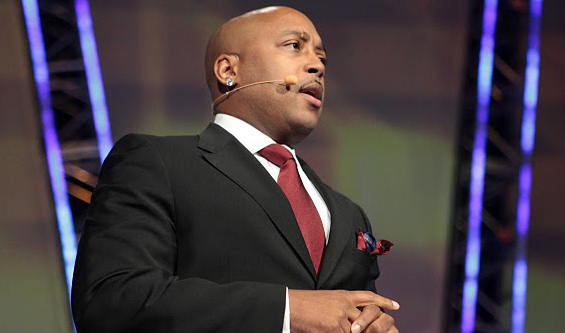Back in the 1990s, a young Daymond John was a hip-hop head. Besides music, he also had a love of fashion. He began sewing sweatshirts and hats in the living room of the house he shared with his single mom. In 1992 he launched the hip-hop-inspired company FUBU (“For Us By Us”). By 1998, it generated $350 million, and at one point FUBU was worth $6 billion.

The company helped solidify streetwear in the fashion industry.
Today, John is one of the most popular and successful Sharks on the hit entrepreneurial show “Shark Tank.”
The star and business expert will also serve as the keynote speaker for Finurah’s inaugural virtual Wealth Summit on Nov. 4 from 10 a.m. to 5 p.m. ET on Facebook Live.
John and other African-American finance giants will participate in the Summit with a 45-minute “Fireside Chat with Daymond John,” scheduled for 4 p.m. ET. Keith Clinkscales, former CEO of Revolt and founder of KTC Ventures, will moderate.
As a Shark on the four-time Emmy award-winning ABC television show “Shark Tank,” John has invested $8,567,000 into budding entrepreneurs, according to Shark Analytics.
Many of his investments have been successful, like sock company Bombas, which has grossed $225 million in sales. For every pair of socks bought, one is donated to a homeless shelter. Bombas has donated five million pairs of socks to the homeless.
Daymond John Gives Words of Wisdom to Black Entrepreneurs
John not only invests in businesses that help people, but he also loves giving advice to African-American business owners.
John is passionate about helping African-American entrepreneurs succeed and spoke about why he wants to offer them financial advice.
“It’s very true and dear to my heart, because being a Black entrepreneur, being somebody who didn’t have all the resources or didn’t even know where the resources were, I’m driven to help others get to where they want to be,” John told Entrepreneur.
John believes African-Americans can support each other through building businesses in Black communities, taking into consideration the obstacles they face.
“There is not enough education out there. There is no legacy wealth — your grandfather and grandmother cannot tell you how they made it because they probably didn’t make it. There are problems with our criminal justice system. And then, of course, there is a small portion of people in power and control that abuse that power.”
He added, “So I think that the only way to empower a community is money they can use to empower themselves and support each other. You’ve got to follow the money. That is going to give them the ability to get a deeper education or invest in their own businesses or raise their kids in better circumstances.”
Black Entrepreneurs Should Seek Mentors and Save Money Before Launching Businesses
John also advised African-American entrepreneurs to feel free to make mistakes to learn how to improve their business ventures.
“You gotta educate yourself, make a lot of mistakes, be a little bit vulnerable and understand that this is a team sport. And the more I can show people how I made it, the more people that will make it,” John told Entrepreneur.
He said in a U.S. Chamber of Commerce 2019 interview that it’s also crucial for Black people to find other African-American mentors to advise them on how to succeed in business.
“Somebody who’s been operating a business for 20 years and been dealing with inflation, competition and changing technology … they still understand the fundamentals of business, and they can teach you those fundamentals,” said John.
Chasing your dreams is admirable in the time of the Great Resignation of 4 million people quitting their jobs in July 2021, as reported by the U.S. Bureau of Labor Statistics. However, John advises potential entrepreneurs to have a six-month emergency fund saved before launching a business and quitting their current jobs.
“If you’re going to … burn all the bridges and move into your business, six months [of capital] is the least you should have,” John told the U.S. Chamber of Commerce.
Don’t miss John’s economic wisdom at the Finurah Wealth Summit.




